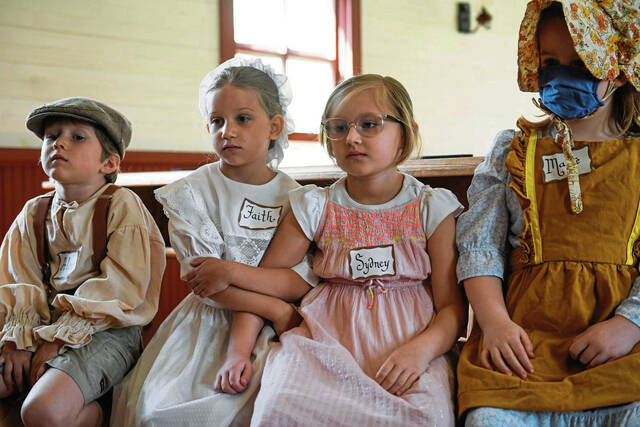https://mirror.triblive.com/local/westmoreland/murrysville-students-get-a-glimpse-into-the-past-at-replica-of-1800s-schoolhouse/
Murrysville students get a glimpse into the past at replica of 1800s schoolhouse

When Laura Hoff was looking to teach her students at Calvary Early Learning Center about local history in Murrysville, she didn’t realize there was a building full of it just up the road.
“I saw a Trib article describing the (replica of the) old Murrysville schoolhouse,” Hoff said. “I stopped there, walked the grounds and peeked in the windows. And ever since then, I’ve wanted to get in there!”
This week, Hoff got the chance, bringing a group of Calvary students to get a period-appropriate lesson from “schoolmarm” Suellen Watt of Monroeville at the 1800s-era schoolhouse that the Murrysville Historical Preservation Society rebuilt in 2020.
Watt outlined how the “school day” was planned.
“Normally, we’d have all the boys sitting on the right and the girls on the left,” she said. “But there’s only one little boy in this group, so they’ll be sitting together.”
One of the first orders of the 1860s-era school day was chores — pumping water and bringing in logs for the authentic potbelly stove that’s been installed in the schoolhouse.
Students were divided into two groups, one working on the alphabet and numbers, and the older students participating in a calligraphy class with quill pens.
“During the school day back then, they always had several different things happening at once, because their ages would span several years in a single class,” Watt said.
Watt, a member of the Murrysville Historical Preservation Society, was joined by fellow society members Sandy Knepper and Sharon Parker. All three were dressed in the same period-era garb they usually wear at the group’s annual festival, held on the same grounds as the schoolhouse and the Sampson-Clark Toll House.
After a brief bag lunch, students went outside for an hour of recess, trying their hand at familiar older games such as checkers, pick-up sticks and jacks, but also some even older recreation.
“There’s a game girls would typically play called ‘graces,’ where they use two dowel rods to toss a hoop back and forth,” Watt said. “There’s also quoits, which is sort of a precursor to horseshoes. It came from Greece, but I believe Native Americans had a version as well, where you try to toss a ring onto — or as close as possible to — an upright peg.”
Recess was mandatory in the mid-1800s, Watt said.
“That was part of the curriculum, because when those kids went home there was no time to play,” she said. “They had chores, they had to help run the farm.”
Hoff’s students probably don’t have to worry about that.
“I’m excited for them to get a lesson, do a craft and learn some of the games they played back then,” Hoff said.
Copyright ©2025— Trib Total Media, LLC (TribLIVE.com)
